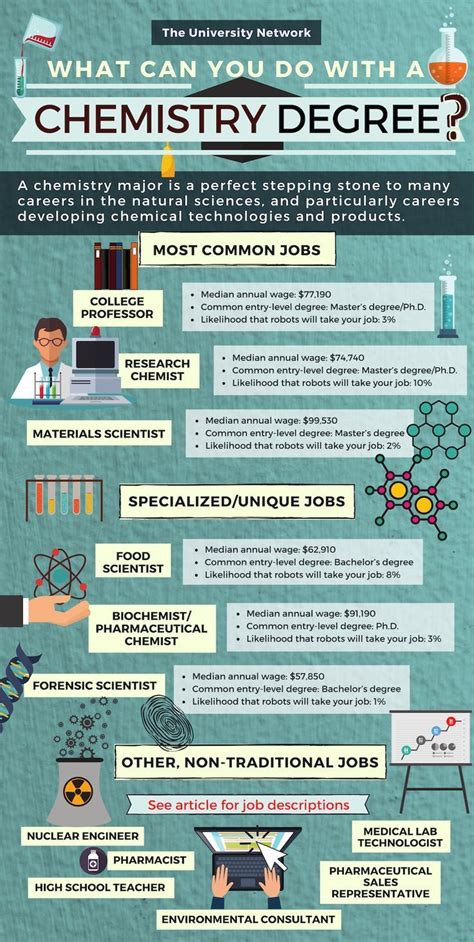Introduction

Chemistry, the science of matter and its interactions, offers a wide spectrum of career opportunities in various industries and sectors. From research and development to manufacturing and healthcare, skilled chemists are in high demand. This article provides a comprehensive overview of the different occupations in chemistry, outlining the job responsibilities, education requirements, and job outlook for each role.
Types of Occupations in Chemistry
1. Research and Development Chemist
Job Responsibilities:
- Conduct experiments to discover new compounds, materials, or processes.
- Analyze data and interpret results to identify trends and patterns.
- Develop and optimize chemical processes for industrial applications.
- Collaborate with colleagues in other disciplines to solve complex scientific problems.
Education Requirements:
- Master’s degree or PhD in chemistry
- Strong analytical and problem-solving skills
- Proficiency in laboratory techniques
2. Analytical Chemist
Job Responsibilities:
- Analyze samples of various materials to determine their chemical composition.
- Utilize analytical instruments and techniques such as chromatography, spectroscopy, and microscopy.
- Provide data and insights for quality control, product development, and environmental monitoring.
Education Requirements:
- Bachelor’s degree in chemistry or a related field
- Excellent analytical and quantitative skills
- Experience with laboratory equipment and instrumentation
3. Manufacturing Chemist
Job Responsibilities:
- Supervise the production and distribution of chemical products.
- Ensure compliance with safety and environmental regulations.
- Optimize production processes to improve efficiency and reduce costs.
- Troubleshoot production issues and identify solutions.
Education Requirements:
- Bachelor’s degree in chemistry or chemical engineering
- Knowledge of industrial chemistry processes
- Ability to work in a team environment
4. Environmental Chemist
Job Responsibilities:
- Monitor and assess environmental pollution levels.
- Develop and implement strategies for environmental remediation.
- Educate the public about environmental issues and promote sustainable practices.
Education Requirements:
- Bachelor’s or Master’s degree in chemistry or environmental science
- Knowledge of environmental regulations and policies
- Strong communication and outreach skills
5. Forensic Chemist
Job Responsibilities:
- Analyze evidence from crime scenes to identify and characterize chemicals.
- Provide expert testimony in court proceedings.
- Develop new analytical methods for solving forensic cases.
Education Requirements:
- Bachelor’s or Master’s degree in chemistry or forensic science
- Experience in laboratory analysis and evidence handling
- Knowledge of criminal justice and legal systems
6. Pharmaceutical Chemist
Job Responsibilities:
- Discover and develop new pharmaceutical drugs.
- Conduct preclinical and clinical trials to evaluate drug safety and efficacy.
- Collaborate with medical professionals to optimize drug formulations and delivery methods.
Education Requirements:
- PhD in chemistry or pharmacology
- Strong background in organic chemistry and biochemistry
- Familiarity with pharmaceutical regulations and industry practices
7. Materials Scientist
Job Responsibilities:
- Study and develop new materials for various applications, such as electronics, aerospace, and medicine.
- Characterize and optimize material properties to meet specific requirements.
- Collaborate with engineers and other scientists to design and test new products.
Education Requirements:
- Master’s degree or PhD in materials science, chemistry, or a related field
- Experience in material synthesis, characterization, and testing
- Strong analytical and problem-solving skills
8. Chemical Educator
Job Responsibilities:
- Teach chemistry at high schools, colleges, or universities.
- Develop and implement lesson plans to engage students in learning.
- Grade assignments, provide feedback, and assess student progress.
Education Requirements:
- Master’s degree or PhD in chemistry
- Teaching certification or experience
- Strong communication and interpersonal skills
Job Outlook
According to the Bureau of Labor Statistics, employment of chemists is projected to grow by 5% from 2021 to 2031, which is faster than the average for all occupations. This growth is driven by increasing demand for chemists in research and development, manufacturing, and environmental protection.
Education and Training
To pursue a career in chemistry, individuals typically need to obtain a bachelor’s degree in chemistry or a related field. Some occupations, such as research and development chemist or pharmaceutical chemist, require a master’s degree or PhD for advancement opportunities.
In addition to formal education, hands-on laboratory experience is essential for developing practical skills. Most universities offer laboratory courses and research opportunities for students to gain practical experience.
Salary and Benefits
According to the American Chemical Society, the median annual salary for chemists in the United States is $84,500. However, salaries can vary significantly depending on experience, education level, and industry sector.
Benefits often include health insurance, paid time off, retirement plans, and professional development opportunities.
Career Advancement Opportunities
With experience and continued education, chemists can advance their careers into leadership or management roles. Some chemists may choose to pursue specialization in a particular area, such as medicinal chemistry or polymer chemistry.
Conclusion
The field of chemistry offers a diverse range of career opportunities for skilled professionals. From innovative research and development to practical manufacturing and environmental protection, chemists play a crucial role in various industries. By understanding the different occupations in chemistry, candidates can make informed decisions about their career paths and pursue fulfilling and rewarding roles that align with their interests and aspirations.
